New Releases
Review: Palo Alto
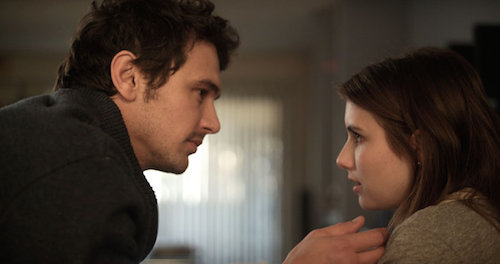
Twenty-seven-year-old Gia Coppola enters the family business with this hypnotically observational debut feature based on a short story collection by James Franco. She ended up focusing on several of his stories, combining characters and situations into one fleshed-out screenplay that attempts to examine the aimlessness of upper class teenage life in Southern California. Anchored by impeccable cinematography from Autumn Durald and a great score featuring original compositions by Blood Orange's Devonte Hynes and Gia's cousin Robert Schwartzman of the band Rooney, the film takes its time to float around the storyline without feeling unfocused.
April (Emma Roberts) runs with the popular crowd, but she doesn't quite fit in. She's shy, she plays soccer and is shamefully called out at parties for being a virgin. She has a crush on a quiet artist named Teddy (Jack Kilmer in his acting debut), but is being pursued by her single-dad coach Mr. B (Franco himself). As a frequent babysitter for his kid, April ends up having quite a bit of private time with Mr. B, which develops into an infatuation on his part. Roberts, who is herself a few years older than the character she is portraying, adds a believable realism to the relationship as a girl who is flattered and even excited about the attention, but can't really understand why a man who is so much older is attracted to her.
Review: A Million Ways to Die in the West
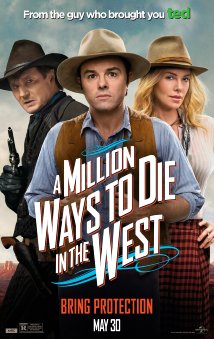
Crassness, unbridled racism, toilet humor, these are all things one familiar with his work expects from Seth MacFarlane, creator of three quarters of Fox’s “animation domination” series with Family Guy, American Dad and The Cleveland Show as well as 2012’s runaway hit movie Ted. One also expects to laugh one’s ass off.
To my enormous disappointment, the laughs never came in A Million Ways to Die in the West, as I suffered through two hours that made MacFarlane’s disastrous night of hosting the Oscars seem wildly successful in comparison. This movie wasn’t him "not at his best." This was the depths of the dreck that didn’t make it out of the writers' room on his TV shows, the proverbial poo flung at a wall that failed to stick.
Perhaps MacFarlane was too busy writing, directing, acting in and producing his take on Blazing Saddles meets There’s Something About Mary to realize it was going to be this bad. Perhaps no one was around who could tell him. The real surprise is how many really big names attached themselves to this. Charlize Theron, Giovanni Ribisi, Amanda Seyfried, Neil Patrick Harris, Sarah Silverman and Liam Neeson may have all been excited to work on this after the success of Ted. Several of these actors are friends of his who have worked with him before. Their enormous talents can’t save this flop.
Tthis thing plays like one of the cutaway Family Guy gags, something that’s normally less than 30 seconds, stretched out to two hours. None of the timing works. The characters are less than one-dimensional and uninteresting. Every gag with a remote chance of being funny is already spoiled in the trailer, and MacFarlane stops to explain the rest of them right into the dirt with none of his usual panache.
With A Million Ways to Die in the West, Seth MacFarlane may have managed to achieve what the most contrarian Fox executives could not: There may be a million ways to die in the West, but the biggest corpse here is his career.
Review: Maleficent
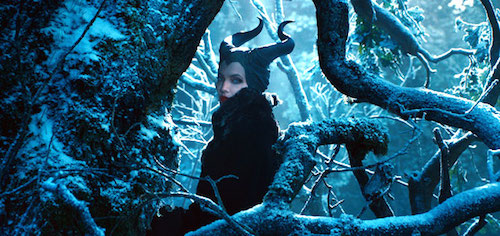
After watching Maleficent, Disney's live-action twist on their own classic animated tale Sleeping Beauty, it becomes evident that nobody but Angelina Jolie could play one of the greatest villains of all time. Ms. Jolie is magnetic onscreen and can smirk in front of a green screen like nobody's business. Her performance may not win her any awards, but she clearly had fun with the part.
The film filters the story of Sleeping Beauty through a revisionist lens. We get to first meet Maleficent when she is just a young fairy, happily flying through the moor. One day, a young human boy named Stefan literally ends up in her neck of the woods and they become unlikely friends. Over time they even fall in love with each other, but in the grand tradition of many boys, he eventually betrays her. In Stefan's quest to become the king, he cuts off her wings. This sequence has an incredibly rapey subtext (not that it will be read that way by a family audience), replete with slipping her a roofie so he can violate her when she's passed out. I thought I was just being a little sensitive, but I've seen a few other reactions on Twitter that have let me know I'm not the only one who felt a little uncomfortable with the entire situation. What happens next is not exactly I Spit On Your Grave, but it does explain a little better as to why Maleficent places a curse on King Stefan's daughter Aurora.
Review: Chinese Puzzle
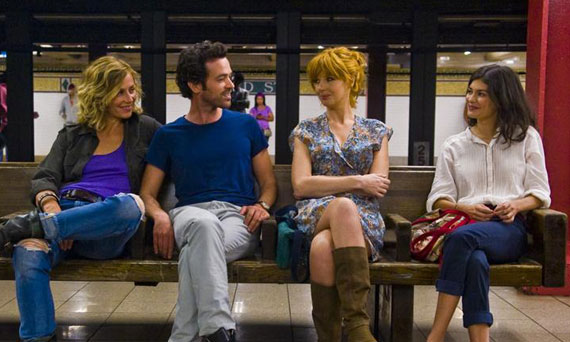
Over the course of 20 years, legendary French director Francois Truffaut created a series of five semi-autobiographical films that explored the life of Antoine Doinel. The character was introduced in 1959 and viewers around the world watched him grow up on screen from a 12-year-old in The 400 Blows into a man in his early thirties in 1979's Love On The Run.
With Chinese Puzzle, which opens Friday in Austin at Regal Arbor, Cedric Klapisch has completed his "Spanish Apartment" trilogy and given us a contemporary series that certainly owes a lot to Truffaut's Doinel films. When we first meet Xavier Rousseau (Romain Duris) in 2002's L'Auberge Espagnole, he is in his early twenties and taking off for the Erasmus student exchange program. He leaves France and his girlfriend Martine (Audrey Tautou) behind to spend a year in Barcelona studying finance. Xavier makes lifelong friends with the roommates he shares in a small Spanish apartment, but finds a lack of actual passion for his field of study.
Review: Belle
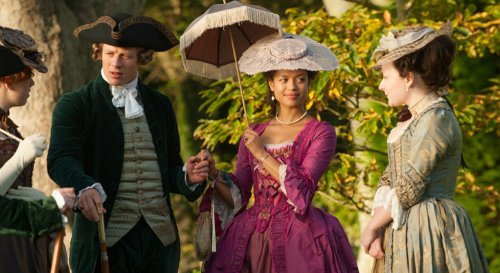
Watching Belle, the refreshingly atypical costume drama released nationwide this weekend, I was reminded of a quote from a book I finished recently. In Jill Lepore's biography of Jane Franklin (Ben's sister), she writes: "History is what is written and can be found; what isn't saved is lost, sunken and rotted, eaten by the earth." [Book of Ages: The Life and Opinions of Jane Franklin]
If Misan Sagay hadn't seen this portrait in a Scottish castle, we may never have learned about the life of Dido Elizabeth Belle. Based on the limited facts the screenwriter was able to find in her research -- given that Dido was a female in the 18th Century, there's unfortunately not a large amount known about her -- Sagay crafted a tale about this real woman, illegitimately born of a black woman and a white admiral, who was raised by the Murray family.
Dido (Gugu Mbatha-Raw, Touch) is left as a child with her great-uncle Lord Mansfield (Tom Wilkinson, Michael Clayton, The Best Exotic Marigold Hotel) after her mother's death. Her father (Matthew Goode, The Good Wife) assures her of his affection. "Know in your heart you are loved, just as I loved your mother," he tells her... then sails off to India. Lord Mansfield, his wife (Emily Watson, Hilary and Jackie) and sister Lady Mary Murray (Penelope Wilton, Downton Abbey, The Best Exotic Marigold Hotel) rear the child alongside her cousin Elizabeth (Sarah Gadon, Cosmopolis, A Dangerous Method).
Review: X-Men: Days of Future Past
 The movie X-Men: Days of Future Past is the best of the X-Franchise and possibly the strongest Marvel Comics screen adaptation to date. This is the summer movie to beat. The story unites two sets of cast members in a time-travel epic in which teams past and future battle to save the world.
The movie X-Men: Days of Future Past is the best of the X-Franchise and possibly the strongest Marvel Comics screen adaptation to date. This is the summer movie to beat. The story unites two sets of cast members in a time-travel epic in which teams past and future battle to save the world.
The film opens in 2023, when the few remaining mutants are on the run, pursued constantly by sentinels, advanced robots with the ability to absorb and use mutant powers, adapting to everything thrown at them. One of the most appealing features of the X-Men comics has always been the unique interactions between characters who combine powers in new and interesting ways, something that featured strongly in X-Men: First Class. The epic opening battle we see in this movie with a different team of trained, experienced mutants is stunningly choreographed, with lavish visual effects.
The surviving mutants meet up with the principal members of the X-Men: Professor Xavier (Patrick Stewart), Magneto (Ian McKellan), Wolverine (Hugh Jackman), and Storm (Halle Berry) and explain they’ve been using a time-travel technique to warn themselves of impending attacks, giving them time to evacuate each location.
Armed with that knowledge, Xavier hatches a plan to travel 50 years back in time and prevent Bolivar Trask (Peter Dinklage), weapons designer and inventor of the sentinels from being assassinated by Mystique (Jennifer Lawrence), the trigger that convinced Congress to fund the sentinel program. The ensuing story takes Wolverine -- the only mutant with the healing ability to survive such a trip -- back to the Nixon era on a quest to reunite Xavier and Magneto as they simultaneously battle evil forces 50 years apart.
Review: Blended
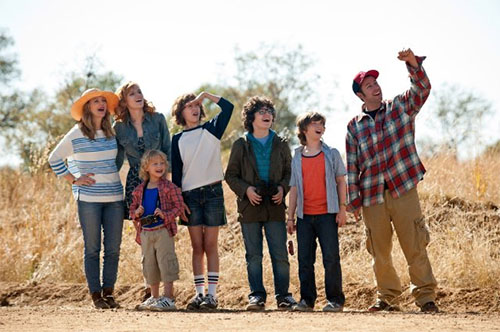
The following is an open letter to the Hooters restaurant chain.
Dear Hooters:
So, what's with your numerous product placements in the new Adam Sandler film, Blended?
When you agreed to have the film's opening scene set in one of your restaurants -- and even allowed a monkey to be dressed as a Hooters waitress -- had you not gotten the memo that Blended isn't like Sandler's recent movies? Maybe you were expecting Blended to be the latest installment in Sandler's series of exceedingly raunchy and breathtakingly idiotic comedies. I expected it also, assuming that Blended would carry on the maturity-deficient tradition of Grown Ups, Jack and Jill, That's My Boy and the criminally unnecessary Grown Ups 2. Had this been the case, Hooters and Blended would have been a perfect marketing match, because Hooters and its fellow breastaurant chains are criminally unnecessary also. (Just kidding! Hooters may be the number one reason why America is the world's greatest country. You don't see breastaurants in Denmark!)
But apparently Sandler has pulled a fast one on us. Instead of an exceedingly raunchy and breathtakingly idiotic gross-out comedy, his new film is a tepidly raunchy and boringly dumb family comedy. If I hadn't seen Blended for free, I'd ask for my money back. And so should you, Hooters, for you and your waitresses do not belong in this movie. (The film's other major corporate sponsor, the uncontroversial Dick's Sporting Goods, is a much better fit.)
Review: Godzilla
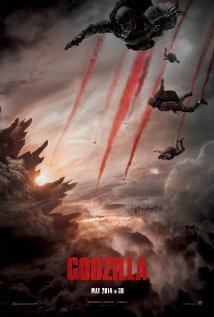 On its 60th birthday and 10 years after the last movie to bear its name, Godzilla returns, bigger than ever, in an incarnation directed by Gareth Edwards (Monsters). Penned by Max Borenstein from a story by Dave Callaham (The Expendables, Doom), this Godzilla offers just what you’ve come to expect from the film franchise: random destruction, mayhem and giant monsters fighting.
On its 60th birthday and 10 years after the last movie to bear its name, Godzilla returns, bigger than ever, in an incarnation directed by Gareth Edwards (Monsters). Penned by Max Borenstein from a story by Dave Callaham (The Expendables, Doom), this Godzilla offers just what you’ve come to expect from the film franchise: random destruction, mayhem and giant monsters fighting.
The story meshes nicely with the 1954 original, with a pseudo-scientific background that presents the monster as a government secret and the actual target of all those south Pacific 1950s nuclear tests. It pays homage to the gigantic creatures as prehistoric gods.
After an emotional and heart-rending first act that introduces the Brody family -- Joe (Bryan Cranston), Sandra (Juliette Binoche) and Ford (Aaron Taylor-Johnson) -- the monster attacks begin in earnest, and the action follows adult Ford, as do the monsters, which seem to be following him around the planet, hell-bent on destroying his family.
Johnson’s character, some kind of military nuclear weapons expert who also just happens to have specialized high-altitude low-opening (HALO) parachute training and a 1950s-era mechanical nuclear detonator in his back pocket, manages to always be in exactly the right place at exactly the right time to be the only person who can save the world in spite of his entire existence being exactly as irrelevant to the ultimate goings-on as Harrison Ford’s Indiana Jones.
In spite of Johnson's existence as less than an insect in comparison to the impossible monsters onscreen, director Edwards has them repeatedly appear to notice the character's presence, as an enormous pair of eyes focuses on him momentarily. There is no interaction, besides the inevitable running away, but this repeated tease, as if to intimate Ford Brody is somehow teaming up with the god-lizard, is in direct conflict to the true theme of not just this movie but the entire Godzilla series: man's utter impotency before the full force of nature.
Review: The German Doctor
 Following the fall of the Third Reich and the liberation of the German Nazi concentration camps, many of the leaders directly involved fled to South America. One of the most famous of those officers was Josef Mengele, a physician in the Auschwitz concentration camp. Due to his barbaric and deadly human experiments performed on prisoners as well as role in the section process for the gas chamber executions, Mengele was known as "The Angel of Death."
Following the fall of the Third Reich and the liberation of the German Nazi concentration camps, many of the leaders directly involved fled to South America. One of the most famous of those officers was Josef Mengele, a physician in the Auschwitz concentration camp. Due to his barbaric and deadly human experiments performed on prisoners as well as role in the section process for the gas chamber executions, Mengele was known as "The Angel of Death."
Argentian filmmaker Lucia Puenzo's novel Wakolda focuses on this infamous man and the true story of an Argentinian family who unknowingly boarded Mengele at their home, now adapted by Puenzo as the movie The German Doctor. Whereas the novel is told through Mengele’s point of view during his exile in South America, the film instead relies more on 12-year-old Lilith (Florencia Bado). Born premature and having suffered from several illnesses at an early age, Lilith is an underdeveloped prebuscent girl who struggles to fit in at her new German-run school in Patagonia.
A chance encounter while traveling to their new home in the tourist town of Bariloche brings Lilith's family, including her pregnant mother Eva (Natalia Oreiro) and dollmaker father Enzo (Diego Peretti), to the attention of a mysterious and charming German doctor (Alex Brendemühl). The doctor quickly entrenches himself in Lilith and Eva’s favor, offering to help with their growth and medical care. He becomes the family's benefactor as he helps Enzo mass produce his designs at a doll factory.
Puenzo lets the audience know within the first act of The German Doctor that this mysterious doctor is the notorious Mengele. He's received as a hero by fellow Nazis also hiding out in Bariloche, but photographer Nora Eldoc (Elena Roger) -- who is also a Mossad spy and victim of one of Mengele's sterilization practices -- recognizes him immediately. This approach increases the tension as we witness the interaction between the doctor and his naive victims. When asked by Eva whether he's had any experience with childbirth and twins, his reply "hundreds" has a chilling impact. Young Lilith becomes lethargic and experiences pain in her bones as the doctor increases her growth hormone.
Summer Indies to Catch: May 2014
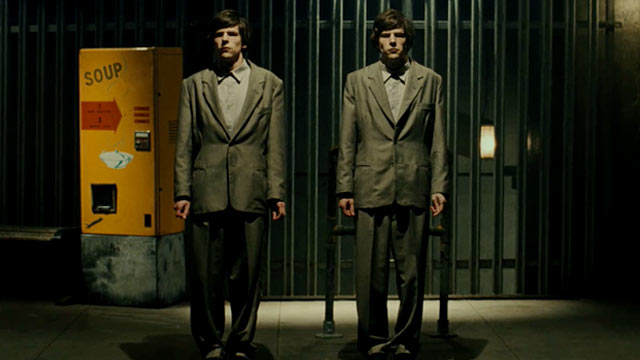
This month, most audiences will be lapping up that guy in tights and yet another reincarnation of Japan's most famous lizard. Thus begins another summer season full of empty sequels and remakes no one asked for. While there are always a collection of smaller films designed to combat the less-than-inspiring season, this year's crop of independents -- which include a 70s movie icon in a Western thriller and a Dostoyevsky adaptation -- is perhaps one of the most bountiful and eclectic in recent years.
Here are few highlights:
Fading Gigolo (now playing at Regal Arbor, available on VOD)
Woody Allen makes a rare appearance in a non-Woody film for this most unconventional tale of comedy and sex in a romanticized New York. When down-on-his-luck Murray (Allen) needs a way out, he convinces his friend Fioravante (John Turturro), a Brooklyn florist, to have a paid threesome with curious dermatologist Dr. Parker (Sharon Stone) and her fiery friend Selima (Sofia Vergara). Soon after, word begins to spread about Fioravante's talent as a middle-age Casanova as Murray takes on the role of unlikely pimp.

